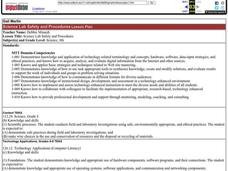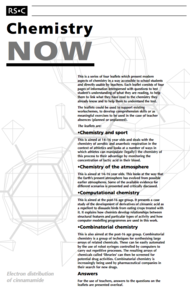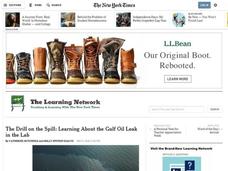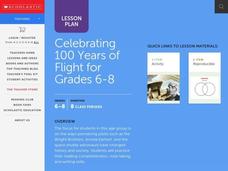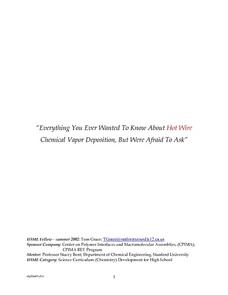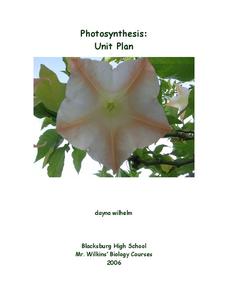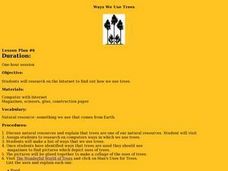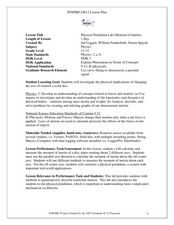Polar Trec
Calorimetry Lab
Young people between the ages of 11–13 need on average about 2,000 calories per day. Within the lab, groups learn about calorimetry and respiration. They explore how it pertains to humans and animals living the Arctic where cold...
Teach Engineering
Earthquakes Living Lab: Designing for Disaster
Build and design to rock and roll. Pairs research building design in earthquake areas and use computer simulations to see the effects of earthquakes on buildings,. They then sketch and explain a building design that would withstand a...
Towson University
Mystery Disease
How did scientists determine the cause of illness before technology? Science scholars play the role of medical researcher in an engaging guided inquiry activity. Using observations, technical reading, and Punnett squares, learners...
Kenan Fellows
Letter Writing to Politicians on Environmental Issues
Let your voices be heard! Pupils research local and national environmental concerns using the Internet. Class members determine an issue they deem important and draft a letter to a local politician expressing their concern about the...
Teach Engineering
Inside the DNA
Get your class to take a closer look at DNA. Pupils conduct research to determine the methods used by scientists to analyze the molecular structure of DNA. The class members investigate different types of molecular imaging along with gel...
Curated OER
Get the Facts
Students explore spiders. In this spider lesson, students fill out KWL charts, discover facts about spiders and how to identify different spiders. Students research spiders on the Internet and do online activities.
Curated OER
A Strange Fish
Students research the sea horse. For this sea horse lesson, students use the Internet to find information about the sea horse on sites bookmarked by the teacher. The students write these facts on a page and create a sea horse poem.
Curated OER
An Introduction to Computer Components
Students experience the first lesson in computer servicing by observing computer components. They observe the internal workings of a computer during the lecture section of the lesson before dismantling a computer to identify its major...
Curated OER
Science Lab Safety Procedures
Eighth graders watch a Lab Safety video and discuss particular questions related to lab safety. Lab equipment is then distributed and the students inspect the equipment and record their finding in their journal. Finally, in groups, 8th...
Royal Society of Chemistry
Computational Chemistry—Chemistry Now
Can some plants make their own animal repellents? Science sleuths examine the properties of cinnamamide in pear trees using an case study about computational chemistry. The resource discusses how vital computers are to research, how...
Curated OER
Applied Science -Physics (4A) Post Lab
Fourth graders explore the history of electricity. In this electricity lesson, 4th graders review the connection between electricity and magnetism. They do a research project on the history of electricity.
Cornell University
Atomic Bonding
Explore the connection of surface area to bonding within atoms. Learners complete lab investigations to model changing surface area with different sizes and concentrations of atoms. A flour fireball demonstration follows the labs to...
Virginia Department of Education
Acid-Base Theory
Litmus paper, why so blue? A chemistry lesson includes a pre-lab activity, practice calculating pH, an experiment measuring the pH in acids and bases, a titration demonstration, and a titration experiment.
Curated OER
Comparing Mitosis with Meiosis
Life science learners view an online animated mini textbook comparing two types of cell division. Working in groups, they use a digital microscope to capture images of cells in different stages of mitosis and meiosis. Then they create an...
Curated OER
The Drill on the Spill: Learning About the Gulf Oil Leak in the Lab
Students research the Gulf of Mexico oil spill and complete experiments to study the effects of oil spills. In this oil spill lesson, students read the NY Times feature on the gulf oil spill. Students visit various links to research the...
Virginia Department of Education
Prokaryotes
Lead your biology class on a cell-sized adventure! Emerging scientists construct models of prokaryotes, then design an experiment to properly grow a bacterial culture. They conclude the activity by viewing the culture under a microscope....
Curated OER
Celebrating 100 Years of Flight
Participate in the 100th anniversary of the first flight. In groups, learners use the internet to research the roles the Wright Brothers and Amelia Earhart played in promoting the use of flight. They use the information to write and...
Curated OER
Everything You Ever Wanted To Know About Hot Wire Chemical Vapor Deposition, But Were Afraid To Ask
To wrap up your year of general chemistry, have lab groups compete in a tot wire chemical vapor deposition (HWCVD) competition. With their foundation in chemical nomenclature, stoichiometry, and gas laws, each group completes several...
Curated OER
Photosynthesis
We all know photosynthesis happens, but why should we care? Here is a unit that covers everything young scholars need to know about photosynthesis. Hands-on activities, assessments, and lectures guide pupils though the physiology of a...
Curated OER
Basic Knowledge of Big Cats
First graders create a KWL chart on big cats. In this animal science lesson, 1st graders brainstorm what they already know about big cats and research big cats using various suggested websites. Students fill in the last column of the KWL...
Curated OER
What Are The Properties of Sea Water?
Ninth graders conduct research on the subject of sea water. They use a variety of resources to obtain information. There are helpful resource links listed in the lesson plan. In conjunction with the research students make inquiry of the...
Curated OER
Ways We Use Trees
Students use the Internet to find the ways we use trees. In this tree lesson, students make a list of the uses of trees and find magazine pictures that show these uses to make a collage. They read The Giving Tree by Shel Silverstein and...
Curated OER
Physical Pendulum Lab
Students calculate the moment of inertia of a disc. In this physics lesson, students differentiate the two methods used in finding the inertia. They construct their own pendulum for the lab.
Curated OER
Sea Horse Habitats
Learners research sea horses around the world. In this sea horse habitats lesson, students use the Internet to take a virtual tour of a sea horse in its natural habitat. Learners work in groups to study a geographical region such as...










